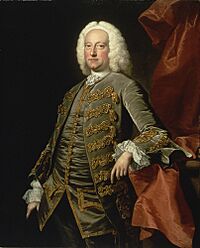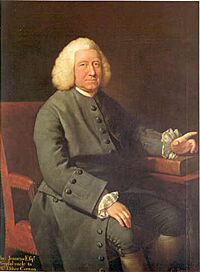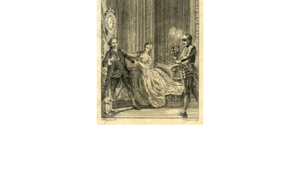Charles Jennens facts for kids


Charles Jennens (born 1700 – died November 20, 1773) was a wealthy English landowner and a big supporter of the arts. He was a close friend of the famous composer Handel. Jennens helped write the words (called libretti) for several of Handel's large musical works, known as oratorios. His most famous work was the libretto for Handel's Messiah.
Contents
Life of Charles Jennens
Charles Jennens grew up at Gopsall Hall in Leicestershire, England. He was the son of Charles Jennens and Elizabeth Burdett. He went to Balliol College, Oxford in 1716 but did not finish his degree.
Jennens was a very religious Christian. He supported the old royal family, the Stuarts, who had been removed from the throne. Because of this, he could not hold any public jobs. He spent his time on his passions: art and music.
After his father died in 1747, Jennens completely rebuilt Gopsall Hall. He made it into a grand house in the Palladian style. He even built a special temple on his land to remember his friend, the poet Edward Holdsworth. People sometimes called him "Solyman the Magnificent" because he was known for being a bit sad and spending a lot of money.
Jennens was a huge collector of fine art. His collection was one of the best in Britain at the time. He also loved music, especially Handel's compositions. Handel often visited Jennens at Gopsall Hall. In 1749, Handel even helped design an organ for Jennens' home. Jennens also asked the artist Thomas Hudson to paint a portrait of Handel. Hudson also painted a portrait of Jennens, which is now in the Handel House Museum in London.
Charles Jennens passed away on November 20, 1773. His memorial, a sculpture by Richard Hayward, is in Nether Whitacre Parish Church. Hayward also made sculptures for Jennens' homes in London and at Gopsall Park.
After Jennens died, his large music library went to his cousin, Heneage Finch, 3rd Earl of Aylesford. Much of this collection is now kept at the Henry Watson Music Library in Manchester Central Library. It includes many handwritten and printed music pieces by Handel and other composers. There are 368 volumes of Handel's music! The collection also has original works by Antonio Vivaldi, like his "Manchester" violin sonatas and an early copy of The Four Seasons. Jennens also had a huge collection of books, including many by William Shakespeare. Most of these books were sold in 1918.
Working with Handel
Jennens knew a lot about the Bible and loved literature. From 1735, he started writing or helping to write the words for Handel's musical works. These included Saul (1735–39), L'Allegro, il Penseroso ed il Moderato (1740–41), Messiah (1741–42), and Belshazzar (1744–45). He might have also helped with Israel in Egypt (1738–39). Jennens gave these libretti for free and they were always published without his name. His works for Saul and Belshazzar are praised for their strong story structure and interesting characters.
Jennens understood music very well, not just literature. He would write notes in his copies of Handel's operas, adding corrections and dates. It's clear that Handel sometimes took Jennens' advice and made changes to his music based on his suggestions.
Their most famous teamwork was on the libretto for Messiah. Jennens took all the words directly from the Bible, with about 60 percent coming from the Old Testament. Music expert Watkins Shaw called it "a meditation of our Lord as Messiah in Christian thought and belief," and said it was "little short of a work of genius." Some people believe that Messiah's focus on the Old Testament came from Jennens' own religious beliefs.
However, Jennens wasn't completely happy with Handel's music for Messiah. He wrote to his friend Edward Holdsworth: "I shall show you a collection I gave Handel, called Messiah, which I value highly. He has made a fine entertainment of it, though not near so good as he might and ought to have done. I have with great difficulty made him correct some of the grossest faults in the composition; but he retained his overture obstinately, in which there are some passages far unworthy of Handel, but much more unworthy of the Messiah."
Editing Shakespeare's Plays

In the early 1770s, Jennens started carefully editing Shakespeare's plays. This was the first time these plays were published one by one with notes from an editor. He finished King Lear, Hamlet, Othello, Macbeth, and Julius Caesar before he died in 1773.
Another Shakespeare editor, George Steevens, criticized Jennens' work. Perhaps Steevens was jealous. He attacked Jennens' work and his personality, saying that Jennens spent too much time with people who were not as smart as him. Steevens claimed this meant Jennens missed chances to improve himself, but instead got too much flattery.
Jennens Family
Charles Jennens was the grandson of Sir Humphrey Jennens, a rich ironmaster from Birmingham. Charles Jennens' cousin, William Jennens, was known as the "richest commoner in England." He died without a wife or children and left behind a huge fortune, estimated at £2 million at the time. Charles Jennens' own wealth was inherited by his sister, Elizabeth Jennens Hanmer (1692–1777). Elizabeth's daughter, Esther Hanmer (1719–1764), married Assheton Curzon, 1st Viscount Curzon.
See also
- Letters and writings of George Frideric Handel
 | Jessica Watkins |
 | Robert Henry Lawrence Jr. |
 | Mae Jemison |
 | Sian Proctor |
 | Guion Bluford |

